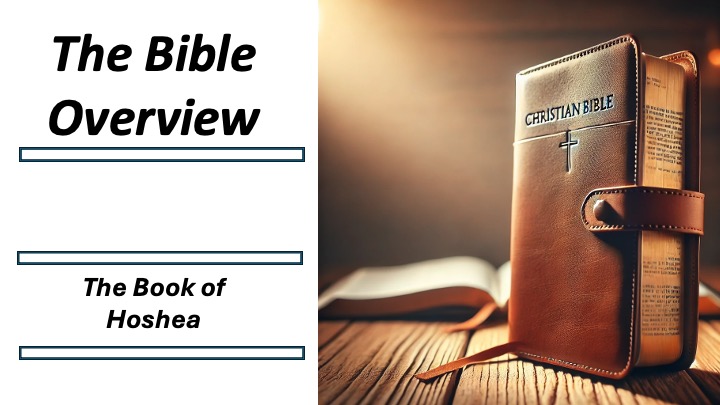Bible Overview Hosea
Mike Ervin

The Book of Hosea: Overview
Authorship
Traditional View:
• The book is attributed to Hosea, son of Beeri (Hosea 1:1).
• He was a prophet to the northern kingdom of Israel during the reigns of
Jeroboam II (793–753 BC) and other kings.
• He was likely a native of Israel (not Judah), given his deep concern for its
fate.
Modern Scholarly View:
• Most scholars affirm Hosea as the historical prophet behind the core of the
book.
• Some scholars suggest later editing or additions during the exilic or
post-exilic period (6th–5th century BC).
• The language and themes reflect an older Hebrew dialect, supporting an
8th-century BC origin.
Date of Authorship
• Traditional View: Written in the 8th century BC before Israel’s fall in 722
BC.
• Modern View:
• The core prophecies date to the 8th century BC.
• Some passages may have been edited or expanded later to apply Hosea’s message
to Judah.
Intended Audience
• Primarily directed at the northern kingdom of Israel.
• Hosea warns of impending judgment due to idolatry and unfaithfulness to
Yahweh.
• The book also has messages for Judah, urging faithfulness.
Major Themes
1. God’s Covenant Love & Israel’s Unfaithfulness – Hosea uses his marriage
to Gomer as a metaphor for God’s relationship with Israel (Hosea 1–3).
2. Idolatry as Spiritual Adultery – Israel’s worship of Baal is portrayed as
infidelity (Hosea 4:12–14).
3. Judgment & Exile – Israel’s unfaithfulness will lead to Assyrian
conquest (Hosea 5:13–14).
4. Call to Repentance – God longs for Israel’s return and offers hope (Hosea
6:1–3).
5. Future Restoration – Despite judgment, God promises healing and restoration
(Hosea 14:4–9).
Chapter-by-Chapter Summary
I. Hosea’s Marriage as a Symbol of God’s Love (Ch. 1–3)
• Ch. 1 – Hosea’s marriage to Gomer, symbolizing Israel’s unfaithfulness.
• Ch. 2 – Israel’s punishment for idolatry, followed by promises of
restoration.
• Ch. 3 – Hosea redeems Gomer, symbolizing God’s faithfulness to Israel.
II. Israel’s Sin and Coming Judgment (Ch. 4–10)
• Ch. 4 – Israel’s corruption and lack of knowledge of God.
• Ch. 5 – Israel and Judah both guilty, Assyria will not save them.
• Ch. 6 – A call to repentance, but Israel’s love is fleeting.
• Ch. 7 – Israel’s political instability and alliances with foreign nations.
• Ch. 8 – Israel has sown the wind, and will reap the whirlwind (8:7).
• Ch. 9–10 – The certainty of exile due to Israel’s rebellion.
III. God’s Love and Final Restoration (Ch. 11–14)
• Ch. 11 – God’s tender love for Israel, despite their rejection.
• Ch. 12 – A historical review of Israel’s unfaithfulness.
• Ch. 13 – Judgment is inevitable, but hope remains.
• Ch. 14 – A final call to repentance and promise of renewal.